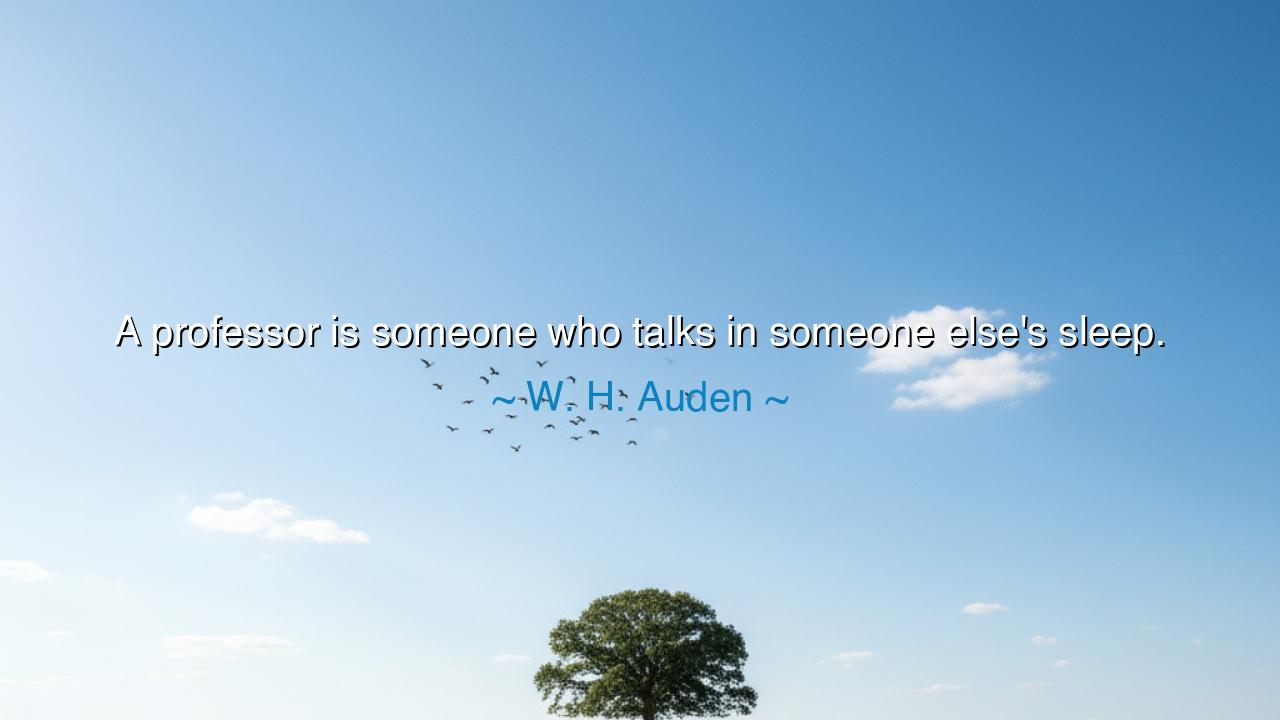
A professor is someone who talks in someone else's sleep.






Hear the wry words of W. H. Auden, poet of wit and wisdom, who declared: “A professor is someone who talks in someone else’s sleep.” At first glance, these words sparkle with humor, yet beneath their jest lies a sharp critique of how knowledge is too often given and too rarely received. The image is vivid: the professor, full of words, speaking endlessly, while the listener drifts into sleep, the precious flame of attention extinguished. It is a warning not only to teachers, but to all who speak without stirring the soul.
The origin of this saying rests in Auden’s lifelong wit, for he delighted in striking paradoxes and playful truths. As one who loved both learning and laughter, he saw how easily the noblest vocation can fall into lifeless routine. The professor, in his lecture hall, may carry the weight of libraries in his head, yet if he cannot awaken minds, his wisdom becomes like words uttered into dreams. In this jest, Auden reminds us that to teach is not simply to speak, but to awaken.
Consider the story of Galileo Galilei, who in his time spoke truths that stirred the world. His lectures were not mere recitations but flames. He spoke of the heavens, of the earth moving around the sun, and though many resisted, he awoke minds from slumber. He was no mere professor talking in someone else’s sleep; he was a prophet shouting into the darkness, rousing humanity to open its eyes. In his courage and passion, he transformed teaching from murmurs into awakening.
Yet history also offers us countless examples of the opposite: the droning voices of lecturers whose students, unmoved and uninspired, left the hall no wiser than they entered. These are the ones Auden mocks—the guardians of knowledge who fail to deliver it as living fire. For words without passion are dust, and learning without awakening is sleep. To speak into another’s sleep is to waste the sacred calling of teaching.
The meaning of Auden’s jest is therefore both humorous and heroic. It reminds us that the true teacher must not be content with sound alone, but must speak so that minds are kindled, so that hearts are stirred, so that slumbering spirits awaken. To be a professor is not merely to possess knowledge, but to transmit it as life itself. Anything less is but noise in the silence of another’s dream.
The lesson, then, is clear: whether you stand in a lecture hall, a workplace, a family, or a circle of friends, do not speak merely to speak. Speak to awaken. Speak so that words take root, so that the hearer cannot drift into sleep but must rise into thought and action. Let your words be arrows of meaning, not the drone of monotony. For the measure of teaching is not the quantity of words spoken, but the awakening they produce.
Practical actions follow. If you teach, prepare not only your material but your heart. Ask yourself: will this stir the soul of another? Use stories, questions, passion, silence, and even humor to shake minds awake. If you learn, resist the temptation of passive slumber. Meet the words with effort, with curiosity, with hunger. For teaching and learning are a covenant: one must speak with fire, the other must listen with vigilance.
So remember Auden’s playful truth: “A professor is someone who talks in someone else’s sleep.” Let it be both a warning and a call. Do not be the one who talks without awakening, nor the one who sleeps without learning. Instead, be among those who speak with fire and those who listen with open eyes. In this way, words become seeds, and knowledge becomes life.






AAdministratorAdministrator
Welcome, honored guests. Please leave a comment, we will respond soon